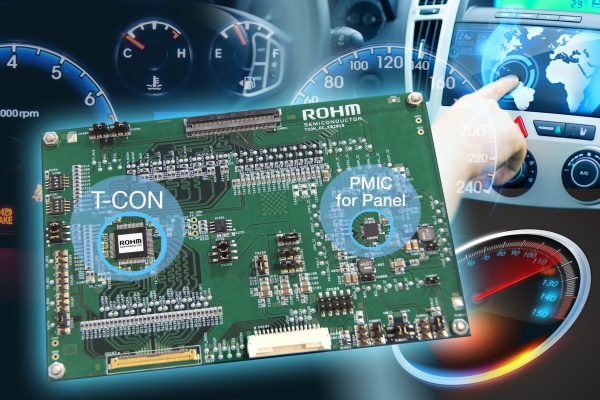ROHM and LAPIS Semiconductor have announced the availability of chipsets designed to drive and control automotive LCDs, including larger high resolution monitors used for navigation and the instrument cluster.
In recent years the adoption of LCDs in vehicles for the instrument cluster, navigation, electronic mirrors, and other systems has risen significantly, while the growing number of applications has increased the demand for larger, higher resolution displays. To achieve these needs, it is necessary to increase the number of driver and controller channels. However, this makes system configuration and operation verification more difficult, strengthening the demand for chipset solutions. In addition, in applications such as electronic mirrors where malfunctions can lead to serious accidents functional safety is required.
ROHM’s new chipsets integrate a gamma correction IC, timing controller (T-CON), source driver, and gate driver for driving HD/FHD class displays (the highest resolution currently on the market), along with a power management IC (PMIC) to ensure optimum drive operation. Each IC is designed to share information as needed, achieving automotive-grade reliability and marking the first time functional safety was successfully introduced in devices for displays. Compatibility with LCDs for side mirrors and speedometers that can lead to accidents is also provided.
In addition, chipset optimization allowed ROHM to cover a wide range of specifications while at the same time integrate a Fail detection function in the timing controller to verify operation, making it possible to configure high resolution LCD panels.
| |||
| |||
| Part No. | Functions | HD 720 (1280 x 720) | FHD Class (1920 x 720) | FHD 1080 (1920 x 1080) | 3K Class (2880 x 1080) | ||||
| Part No. | Qty | Part No. | Qty | Part No. | Qty | Part No. | Qty | ||
| Timing Controller | LCD driver control | BU90AL211 | 1 | BU90AL211 | 1 | BU90AL210 | 1 | BU90AL210 | 1 |
| Source Driver | LCD drive | ML9882 (1440ch) | 3 | ML9882 (1440ch) | 4 | ML9882 (1440ch) | 4 | ML9882 (1440ch) | 6 |
| Gate Driver | LCD drive | ML9873 (960ch) | 1 | ML9873 (960ch) | 1 | ML9872 (540ch) | 2 | ML9872 (540ch) | 2 |
| PMIC | Multifunction power supply IC | BM81810MUV | 1 | BM81810MUV | 1 | BM81810MUV | 1 | BM81810MUV | 1 |
| Gamma Correction IC | Image correction | BD81849MUV | 1 | BD81849MUV | 1 | BD81849MUV | 1 | BD81849MUV | 1 |
Availability: Now
Key Features
- The world’s first automotive chipsets that provide functional safety in LCDs
Each IC configured in the chipset integrates a function for mutually selecting the expected failure mode. As a result, it is possible to complementarily detect panel failure and confirm and provide feedback on information such as input signals to the LCD as well as peeling/destruction of the LCD driver. Introducing functional safety contributes to the prevention of serious accidents caused by the malfunction of monitors for the speedometer, side mirrors, and other systems.
For example, the driver may not notice that the screen for the side mirrors has frozen in the case no object is detected at the time, presenting a danger that can lead to serious injury if someone suddenly were to go behind the car while the car is moving. To prevent this ROHM delivers functional safety that can detect if the screen is frozen.
|
| LCD Failure Modes | Black Screen | Freeze/Burn-In | Display Delay | |
| Abnormality Occurrence Location | ||||
| Expected IC Error Based on Abnormality Occurrence | PMIC | ① Shutdown | – | – |
| T-CON | ② LVDS signal error ③ Internal register fault | ⑦ LVDS signal error | – | |
| Source Driver | ④Input voltage error ←PMIC detected ⑤No input signal ←T-CON detected ⑥ Fixed output Low | ⑧ Indeterminate input signal | – | |
| Gate Driver | – | ⑨Input signal error ←T-CON detected | ⑩Input voltage error ←PMIC detected | |
The power management IC includes a double register for detecting abnormalities and auto-refresh function to enable recovery during abnormal operation, ensuring high reliability against unexpected influences such as noise.
- Easily configure HD/FHD class high resolution LCDs
ROHM chipsets are designed to cover a wide range of specifications, making it possible to easily configure high resolution HD/FHD class LCDs.
In addition, the timing controller is equipped with a Fail detection circuit for verifying chipset operation. And the setting of each output in the power management IC can be changed by simply rewriting the internal register value. This reduces development resources while contributing to common board designs.
|
- Comprehensive design support provided, including application boards
ROHM is currently preparing manuals, reference designs, and application boards that facilitate chipset evaluation. Please contact us for more information.
Terminology
| Resolution | Equivalent Panel Size | |
| WVGA | 800 x 480 | 7-8 in and smaller |
| HD | 1280 x 720 (800) | 7-8 in and smaller |
| FHD | 1920 x 1080 (1200) | 7-8 to 10 in and larger |
| WQXGA | 2880 x 1280 2560 x 1600 | 10 in and larger |
HD / FHD (High Definition / Full High Definition)
Both HD and FHD refer to video resolution. HD is 1280 × 720 pixels, while FHD is equivalent to 1920 × 1080 pixels.
Functional Safety
Functional safety includes safety measures (concepts for ensuring safety) that minimize risk by adding functionality such as monitoring and protective equipment. In the automotive market, functional safety minimizes risk to an acceptable level in order to prevent bodily injury in the event of malfunction due electronic system failure. There is even an international standard for automotive functional safety (ISO26262).
Meanwhile, protection functions frequently referred to in ICs are functions that ensure the safety of the IC itself by monitoring for internal malfunctions and damage.















